Featured Articles
- 01 How to Install, Initialize and Partition SSD
- 02 How to Clone HDD to SSD
- 03 How to Migrate OS from HDD to SSD
- 04 How to Format SSD on Windows
- 05 How to Securely Erase SSD
- 06 How to Install Windows 10/11 on SSD
- 07 Use SSD and HDD Together on Windows 11/10
- 08 SSD Fix 1: Repair Corrupted SSD
- 09 SSD Fix 2: SSD Not Initialized
- 10 Repair and Restore Not Working/Failed/Dead SSD
Solid-state drives (SSDs) have revolutionized data storage with their speed, durability, and efficiency. However, like all electronic devices, they're not immune to corruption or failure. SSD corruption may caused by a faulty file system, firmware glitch, or degraded NAND cells, which can impact performance or render data inaccessible. Fortunately, specialized SSD repair software can diagnose, fix, and even prevent problems. In this guide, EaseUS will explore a best SSD repair tool, how to use them, and other manual solutions to check and repair your drive.
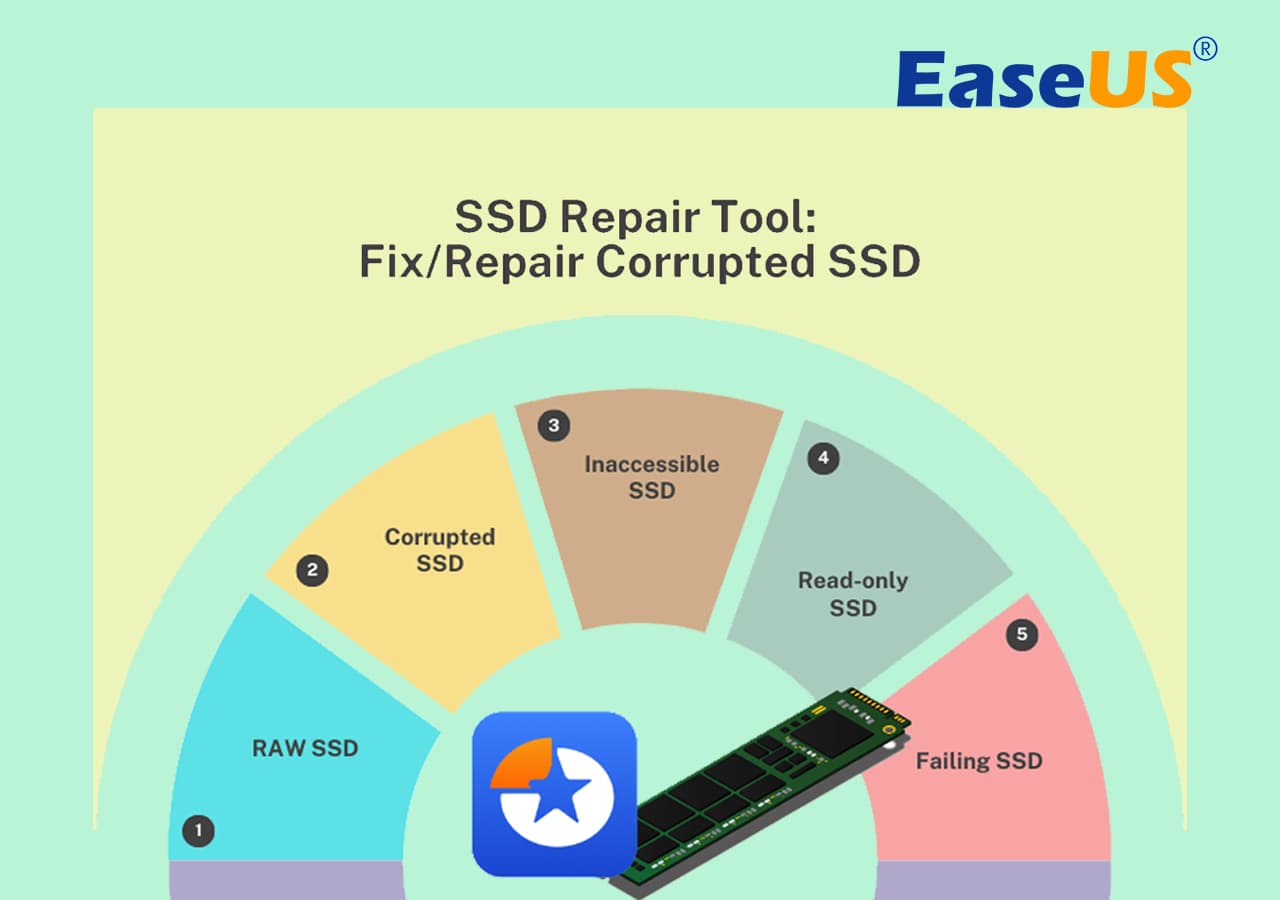
How to Repair SSD Manually - 3 Basic Ways
There are many ways you can try to fix SSD, including simple and complex solutions. This part covers the manual means to repair corrupted SSD/HHD by updating firmware drivers or using the Command Prompt. Before proceeding with any attempt to fix a corrupted SSD, it's crucial to back up your data as follows:
✅Use external drives or cloud storage to back up your important files.
✅Use a data recovery tool if you can't access certain files.
✅If you're unable to access the drive, you might want to try using a bootable USB or live CD to retrieve your data.
Way 1. Update SSD's Firmware to Repair SSD
SSD Firmware is the software that controls the SSD's internal operations, such as wear leveling, data handling, and error correction. Firmware updates can significantly improve an SSD’s performance, fix bugs, and sometimes even extend the lifespan of the drive.
Step 1. Identify Your SSD Model and Firmware Version
- Open Device Manager (Windows + X > Device Manager).
- Under Disk Drives, right-click your SSD and select "Properties."
- Go to the "Details" tab and select Firmware Version from the dropdown list. Note down the firmware version.
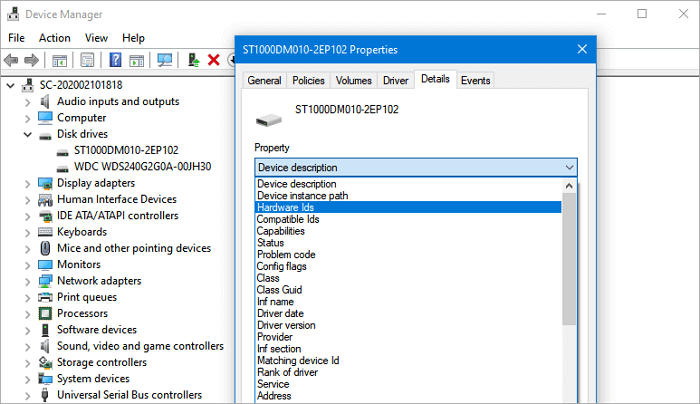
Step 2. Visit the Manufacturer's Website
- Visit the manufacturer's support page to check if a new firmware version is available.
- Most SSD manufacturers provide a dedicated tool to update SSD firmware. Download it.
Step 3. Update the SSD Firmware Automatically
- Install and open this SSD firmware software, it will automatically detect and update your SSD firmware.
Once the update is complete, check if the SSD is functioning properly.
Way 2. Update your SSD Drivers
Step 1. Press Win+X keys > select "Device Manager".
Step 2. Expand "Disk drives" > right-click your SSD > choose "Update driver". Then, follow the on-screen instructions to update SSD's driver. When the process finishes, restart your PC.
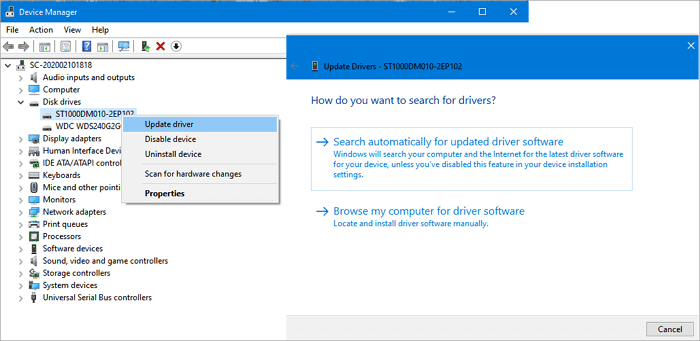
Or you can choose to uninstall and reinstall the driver to troubleshoot.
Way 3. Run CHKDSK to Fix File System Error
- Press "Win + R" to open the "Run" dialog.
- Type: cmd and hit Enter to open "Command Prompt".
- Click "Run as administrator" and log in as Administrator.
- Type: chkdsk C: /f /r /x in Command Prompt and hit Enter.

Note: C: shall be the drive letter of your corrupted SSD or HDD and do remember to replace C: with the right letter. Wait for the process to complete, then type exit and press Enter to close the command prompt.
Are these solutions to repair corrupted SSD/HDD without losing data helpful? If yes, you can share them with your friends facing the same problem!
How to Repair Corrupted SSD with a Professional SSD Repair Tool
EaseUS Partition Master Professional is a top-notch disk and drive management tool that provides comprehensive, effective solutions to help you repair corrupted or damaged SSD by checking file systems, rebuilding MBR on SSD, formatting, and erasing SSD.
1. Check and Fix File System
Step 1. Right-click the target partition that may have a problem.
Step 2. Choose "Check" > "Check File System".
Step 3. In the Check File System window, check the "Try to fix errors if found" option by clicking the "Start" button.
Step 4. Please wait patiently. After the process, you can click the "Finish" button to exit the window.
🚩SSD repair tool free download here🔽
2. Rebuild MBR to Repair SSD
If the SSD is your system disk and it's with MBR partition style. When its MBR gets damaged, your computer may not start properly. After booting up, the system will prompt "Disk boot failure, Insert system disk and press enter" to tell you that the boot partition hard disk cannot be found or there is no boot file on the hard disk. Please insert the boot disk and press Enter.
In this case, you can directly install EaseUS Partition Master and use its "Rebuild MBR" feature to solve the problem.
Step 1. Create a WinPE bootable disk
- Launch EaseUS Partition Master, and click "Bootable Media" on the toolbar. Select "Create bootable media".
- Click "Next" to finish the process.
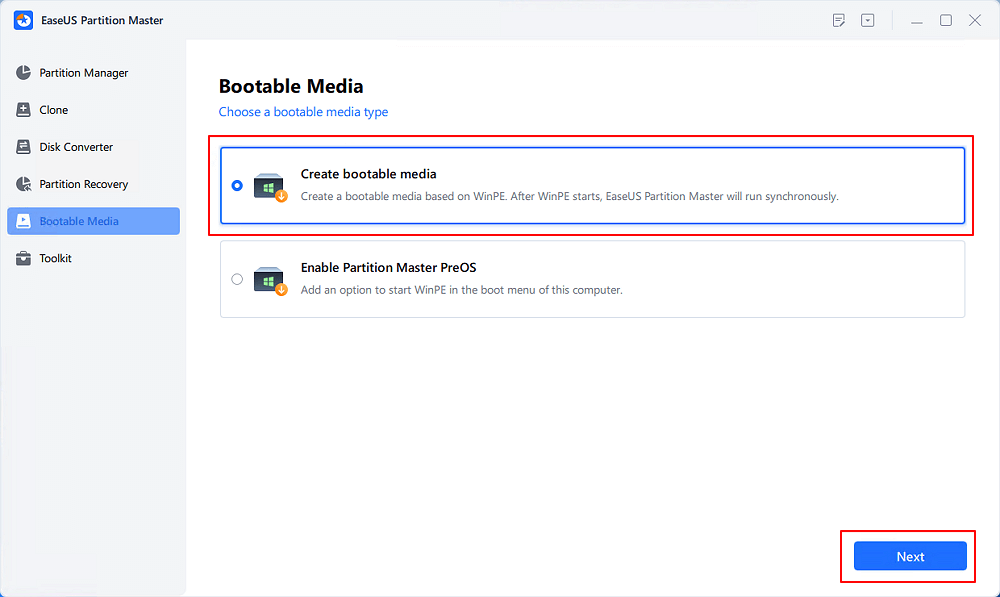
Step 2. Boot EaseUS Partition Master Bootable USB
- Connect the bootable USB or CD/DVD to your PC.
- Press F2 or Del when you restart the computer to enter the BIOS screen. Set and boot your computer from "Removable Devices" or "CD-ROM Drive". And then EaseUS Partition Master will run automatically.
Step 3. Rebuild MBR
- Click "Toolkit" and choose "Rebuild MBR".
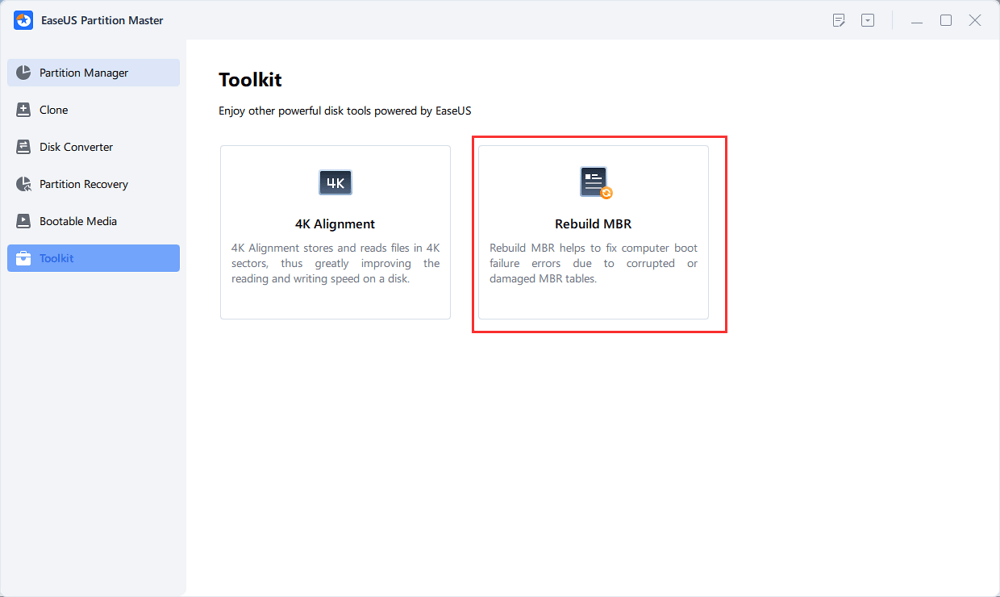
- Select the disk and the type of MBR. Then, click "Rebuild".
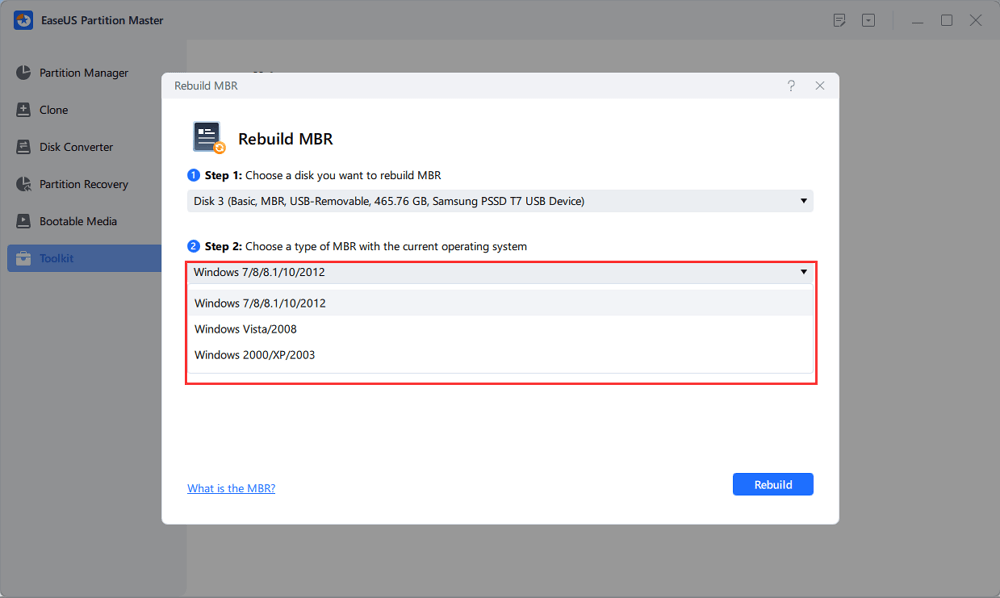
- After that, you can see "MBR has been successfully rebuilt on Disk X".
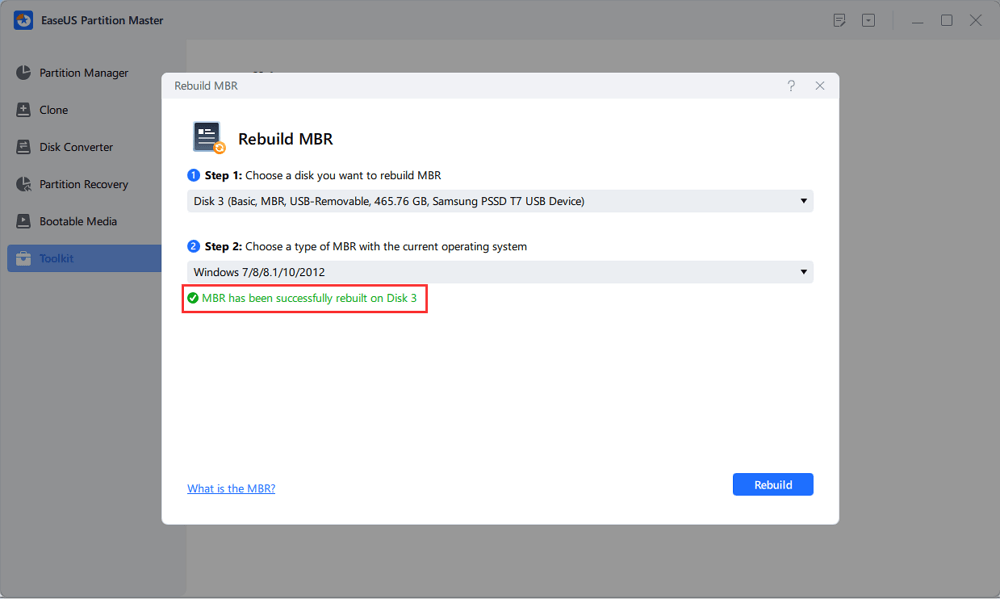
If this method efficiently repaired your SSD and it's now working properly on your PC, share this method to help more of your friends online:
3. Format/Erase the Damaged SSD
If the above methods won't work and you can't repair the SSD anyway, or if the SSD is write-protected due to file system corruption, you can fix the corrupted SSD drive by formatting or erasing the SSD via EaseUS Partition Master:
- If SSD is a data disk, you can reuse it directly after formatting and wiping.
- If the SSD is a system disk, you can reinstall the system.
Launch EaseUS Partition Master, right-click the SSD disk or drive, choose Wipe Data or Format, and wait for the process to be accomplished.
For more details, you may refer to this page for help:
- Summary:
- Using the four options of EaseUS Partition Master, you can repair corrupted SSD on Windows 10/8/7. Besides the excellent SSD repair function, this powerful partition management software also enables you to resize/move partitions, merge, create, format, and delete partitions, perform SSD 4K alignment, migrate OS to SSD, and more.
How Do I Know If My SSD Is Corrupted
Although SSD is better than HDD in some ways, the problem with it is not rare. If the SSD has the following five significant symptoms, it is likely to corrupt or damage. Then, you may need to repair the SSD. Below are the common symptoms of SSD is dead or corrupted.
1. Files on SSD are unreadable
If some files on SSD are unreadable, the data is in a bad block. And you can't copy the files.
2. Unable to write, SSD becomes read-only
If you are directly prompted that you cannot write or write-protect, refuse to write, etc. when you put a file in the SSD, there is no doubt that it is broken.
3. SSD drive runs slowly
If you are using an SSD with slow read/write speeds or your system crashes frequently, you need to use a few tools to check for SSD damage and be prepared to replace your hard drive in time to prevent important data loss.
4. Corrupted Files: Files that no longer open, give error messages, or appear as empty after being accessed may be corrupted due to SSD problems.
5. BIOS Detection Issues
If your SSD intermittently shows up or is entirely unrecognized in BIOS or the system boot menu, it may be corrupt.
6. Frequent Crashes or Freezes
If your computer freezes or crashes frequently when accessing the SSD, it's a likely indication that the drive is having issues.
Bonus Tip: Recover Data from Corrupted SSD
Before you repair SSD, to ensure data security, you'd better perform a corrupted SSD data recovery in two ways below.
1. Connect SSD/HDD to a Healthy PC
If you are having one of the below issues, try this method to connect SSD or HDD with another SATA port and cable or another PC to restore data:
- The present PC cannot read or recognize SSD/HDD
- The current PC cannot boot properly
A new SATA port and cable or a new PC may be able to help you access data on your SSD/HDD if you have the above two situations.
2. Use Hard Drive Data Recovery Software for Corrupted SSD Recovery
If Method 1 cannot access your data in SSD or HDD, or SSD/HDD becomes corrupted with RAW error, you'll need a professional hard drive data recovery software.
Here, you may try EaseUS Data Recovery Wizard, which supports you to restore all lost data on HDD/SSD, external hard drive, USB, or SD card. All Windows systems (Windows 10, 8, and 7) are supported. Three steps will restore all data from RAW or corrupted SSD/HDD: Run Software > Select and Scan disk data > Preview and Restore data. For more details, read also:
Recover Data from Dead, Failed or Crashed SSD
This page shows you how to recover data from dead/failed SSDs with powerful dead SSD data recovery software in a few simple steps.
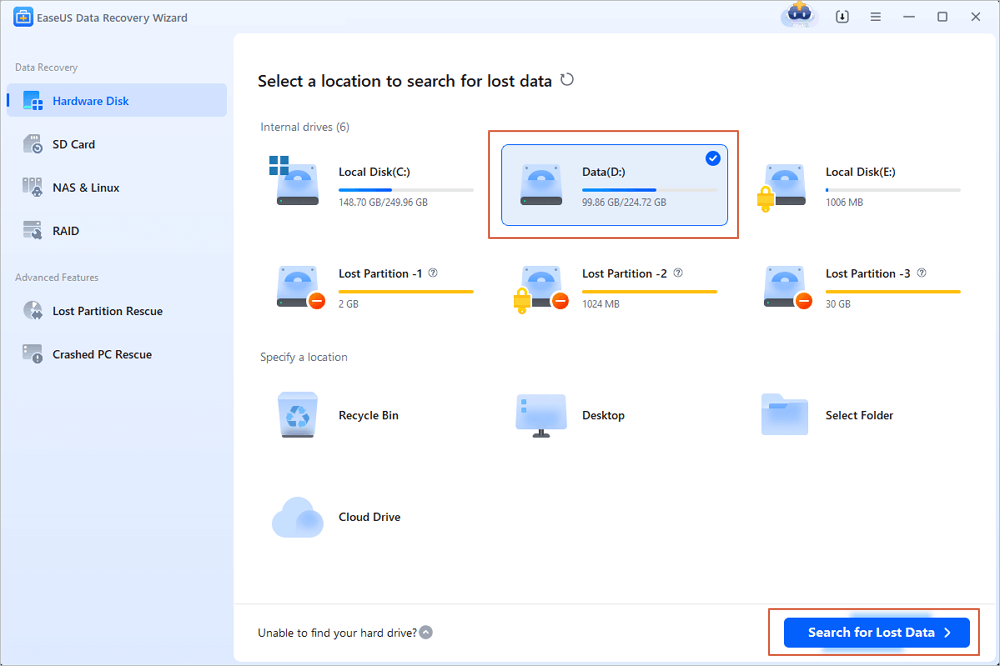
Conclusion
In conclusion, repairing a corrupted SSD can be achieved by using manual methods and a professional SSD repair tool - EaseUS Partition Master. Manual approaches include updating firmware and drivers, running CHKDSK to fix file system errors, and checking physical connections. For more complex issues, tools like EaseUS Partition Master offer comprehensive solutions such as checking and fixing file systems, rebuilding MBR, and formatting the SSD. Give it a try!
FAQs About SSD Repair Tool
1. What Causes SSD Corruption?
Before diving into SSD repair software, it's essential to understand what could lead to SSD corruption. SSDs can fail or degrade for several reasons, including:
- NAND Flash Wear
- Firmware Malfunction
- Power Loss
- Bad Sectors
- Operating System or Driver Errors
2. How long do SSDs last?
Most SSDs last between 3 to 10 years, depending on factors such as usage patterns, type of SSD (e.g., SATA, M.2, NVMe), and total bytes written (TBW), with NVMe SSDs generally being more durable and lasting up to a decade.
3. How do I fix a corrupted SSD?
Overall, you have six solutions to fix a corrupted SSD. For instance, update SSD's firmware and drivers, check and fix the file system, rebuild MBR, format, and erase problematic SSD.
4. How do I fix my SSD when it is not detected?
First, you need to fix the SSD not showing up matter via changing the drive letter, SSD initialization, reinstalling SSD's driver, etc.. When your SSD shows up, you can use the methods provided in this tutorial to repair corrupted SSD.
Was This Page Helpful?
"I hope my articles can help solve your technical problems. If you are interested in other articles, you can check the articles at the bottom of this page. Similarly, you can also check my Twitter to get additional help."
Written by Tracy King
Tracy became a member of the EaseUS content team in 2013. Being a technical writer for over 10 years, she is enthusiastic about sharing tips to assist readers in resolving complex issues in disk management, file transfer, PC & Mac performance optimization, etc., like an expert.
Related Articles
-
Top 4 Best Windows 10 Password Reset Tools 2026 Review🏆
![author icon]() Oliver/Jan 29, 2026
Oliver/Jan 29, 2026 -
Full Guide to Upgrade PS4 to SSD [Quick & Easy]
![author icon]() Cici/Jan 29, 2026
Cici/Jan 29, 2026 -
Windows Vista Password Reset Without Disk | How to Guide
![author icon]() Sherly/Jan 29, 2026
Sherly/Jan 29, 2026 -
Why Does Computer Keep Crashing? 10 Instant Ways to Fix Computer Keeps Crashing
![author icon]() Cedric/Jan 29, 2026
Cedric/Jan 29, 2026